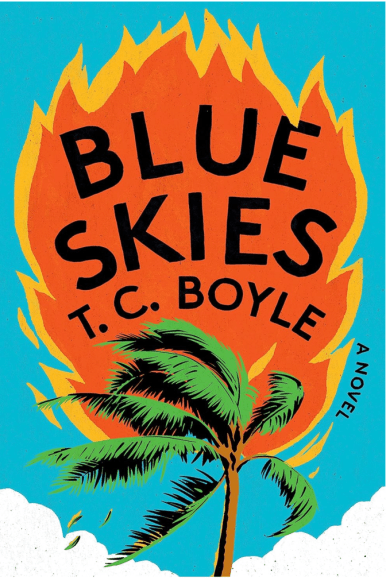Book Review | ‘Blue Skies’ by TC Boyle
The Catastrophes of Climate Change Loom Over Montecito in Boyle’s Latest Novel

Even the grimmest climate-change novels usually contain a glimmer of humor, and books such as Lydia Millet’s The Children’s Bible contain passages that are downright fun, despite all the tragedy. Nevertheless, TC Boyle is onto something different in his new novel, Blue Skies. It’s a comedy, for sure, but in Northrop Frye’s sense of the “Society of the Old” in conflict with the “Society of Youth.” Old people, of course, are responsible for the looming catastrophes of climate change which appear, in bold, in each chapter, but the youth of Blue Skies are none too wonderful themselves.
The novel focuses on three central characters: Ottile, a graceful, if often flummoxed, Montecito matriarch; her daughter Cat, a borderline alcoholic living in a decaying beach house on the South Florida coast with twin babies and her “Bacardi ambassador” husband, Todd; and Ottile’s son Cooper, a “bug nerd” whose romantic entanglements are fraught and who can never quite get it together to complete his PhD in entomology.
All the characters are deeply flawed, some much more so than others, and initially that may be a bit off-putting. However, their inadequacies make them real and give the novel its frisson. What Boyle has done is tell the story of the sort of dysfunctional family that might be found on any block in Santa Barbara and set them down in a world that’s disintegrating even more rapidly than our own. The characters go about their lives haltingly, ignorant, sometimes disgustingly entitled — frequently bumping up against the devastations of climate change as if they were just another headache to deal with during the course of the day.
You can see this mixture of the mundane and the chilling in Ottile’s musings about how to celebrate the retirement of her physician husband, Frank: “Did people even give dinner parties anymore? What was the point? Half the world was flooded and the other half parched and the crops kept failing and failing again. People were starving, even here in California. There were refugees everywhere. The wine tasted of ash.” That last line, with its notes of both snobbery and Biblical doom, is classic Boyle, a little trimeter poem: iamb | trochee | iamb.
TC Boyle is also a master of the set piece, of combining description, dialogue and subtle commentary to create moments of great comedy and pathos, often on the same page. Without spoiling any plot points, some of the more memorable extended scenes have to do with hurricanes, flooding, wildfires, and snakes. Indeed, there are lots of snakes in Blue Skies, and although the creatures are simply following their own reptilian mandates, they cause plenty of problems for the humans trying to control them.
While any English-speaking inhabitant of Planet Earth will appreciate the disasters faced by the cast of Blue Skies, residents of Florida who have survived Ian, Michael, Irma, and so on, will especially appreciate Boyle’s skill with quietly menacing details from the natural world: “The water was up again, creeping up under the house and slapping at the pilings with a slow steady protracted pulse.” And the scenes set in California will be particularly resonant for residents of the Golden State. In Santa Barbara and Montecito, for instance, the power is often out for much of the day, resulting in interior temperatures of 97 degrees, while outside, in the cloudless blue skies, the heat soars to 116.
The novel’s ending offers a possible, almost literal deus ex machina, but there are no easy outs for the people in Blue Skies, any more than there are for us, the book’s readers. Still, it’s comforting to have someone of Boyle’s prodigious narrative gifts telling us our story, hoping we will listen.
This review originally appeared in the California Review of Books.




You must be logged in to post a comment.